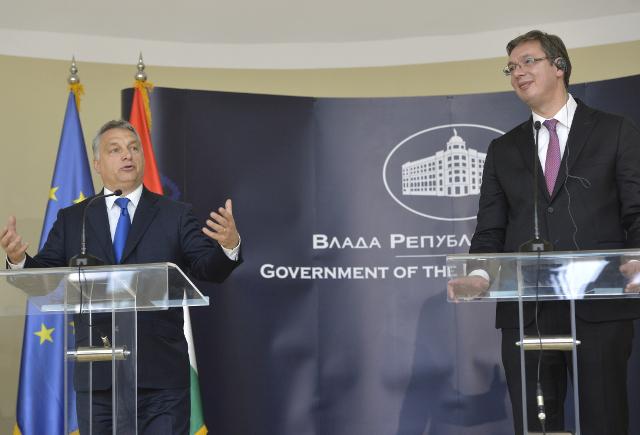Serbian, Hungarian PMs on ties, cooperation, migrations
Serbian Prime Minister Aleksandar Vucic on Monday described his country's northern neighbor, Hungary, as "a true friend."
Monday, 21.11.2016.
13:12

Serbian, Hungarian PMs on ties, cooperation, migrations
"My thanks go to Orban for coming to Nis, which is a strategic city for us. Serbs know how to respect that and we are grateful, your visit is of historic significance," said Vucic.According to the prime minister, the relationship between Serbia and Hungary is that of "true friendship," while he and Orban "agreed that when it comes to politics, relations are at the highest possible level."
Besides this, Vucic stressed that the two countries have "good relations" when it comes to migrants and the fight against terrorism, while their interior ministers "cooperate well and are ready to further improve this."
"My thanks go to Hungary for their true support on (Serbia's) road toward the EU, to Prime Minister Orban and (Hungarian) Foreign Minister (Peter) Szijjarto. What Szijjarto has been saying in Brussels during conferences of importance to us, nobody else in Europe has said. Serbs know how to be grateful, thank you, Hungarian friends," said Vucic, and added:
"You are always welcome in Serbia, I hope that next year we will be able to host you in some other part of Serbia."
Vucic also thanked Istvan Pasztor, the president of the Assembly of Vojvodina, Serbia's northern province, who heads the Alliance of Vojvodina Hungarians (SVM) party, for "always being a bridge between the two governments and somebody who supported with an open heart all that is best in Serbia and Hungary."
Viktor Orban, who arrived in Serbia on Sunday along with the members of his government, also addressed reporters, thanked Vucic for the invitation, and said the visit was "an expression of respect toward the Serb people."
"Our analyses show that Serbia has a momentum toward development. We've gone through that in our history, it's hard to believe that a time will come that is better than what we've left behind - optimism is not commonly found in central European countries, but, the numbers speak for themselves," Orban said.
According to the Hungarian prime minister "stability in Serbia is the key to Central Europe's stability."
Orban also offered his support to Serbia in the fight against terrorism and in stopping the migrant crisis, both in personnel, and "expert assistance."
He thanked Serbia "for taking care of Hungarians who live here," noting that the number of ethnic Serbs in Hungary was much lower than the number of ethnic Hungarians in Serbia, and adding: "But we will always support those measures that will help preserve the national identity of Serbs in Hungary, and we accept all the financial burdens related to that."
Asked whether he had any "political advice" when it comes to migrants - "or if it all amounted to a (border) wall," Orban said this was a difficult question, "one that must receive a thought-out and careful reply."
"Hungary is open for all Serbs, if they wish to work, trade, or invest there, or simply visit. We gladly accept all Serbs. It's not easy to compete with your (Serbian) prime minister when it comes to hospitality - but we, too, have a soul, like Serbs."
According to him, the topic of migrants is difficult, "one of those where once a mistake is made, it can never be corrected":
"If migrants were to think once that Hungary can be their destination, they would never leave. It's no joke, one cannot make mistakes about that. Life is changing in those countries where migrants have arriving en masse - if not in a day, than in several years' time. What will happen when our children and our grandchildren ask us, 'why did you allow the state, the culture, the ethnic composition to change'... what will we say to them?"
Still, Orban, added, he sees the migrants as the victims.
"Their countries' bad governments, smugglers, and the EU's wrong policy have brought them to this situations. We feel for them, but we should not be bringing the problem here, we should be taking aid to their countries. We will do everything so they can return to their homelands. We want to be in control of the situation, and we don't want to accept the diktat from Brussels. We are open for all Serbs, but we are strongly opposed to the policy of migrations," Orban concluded.
















































Komentari 4
Pogledaj komentare